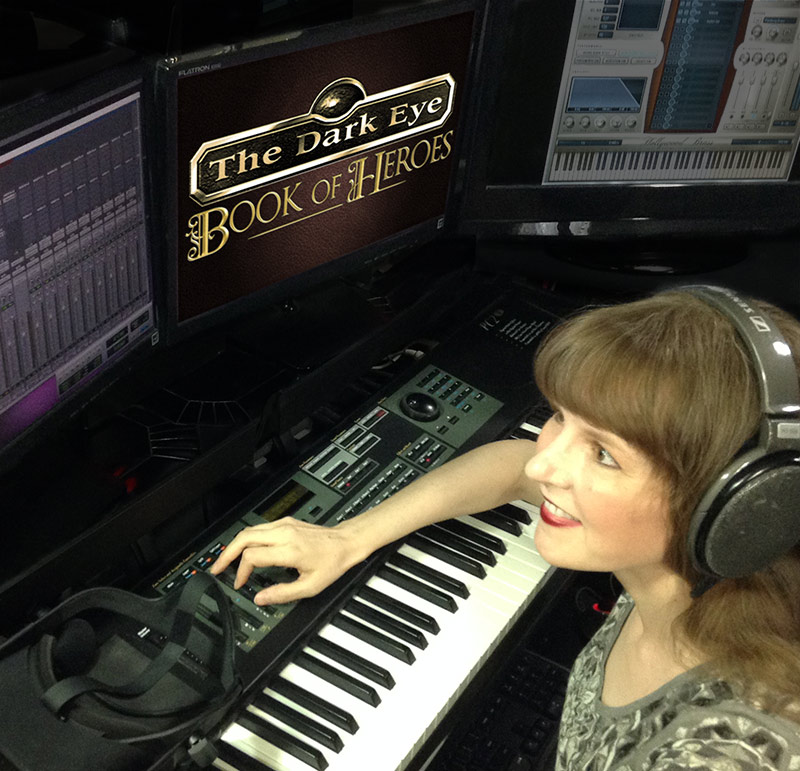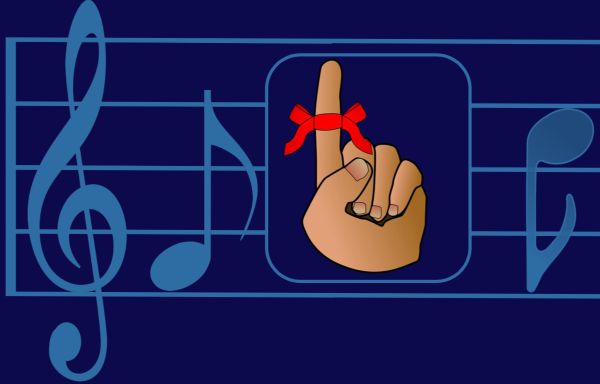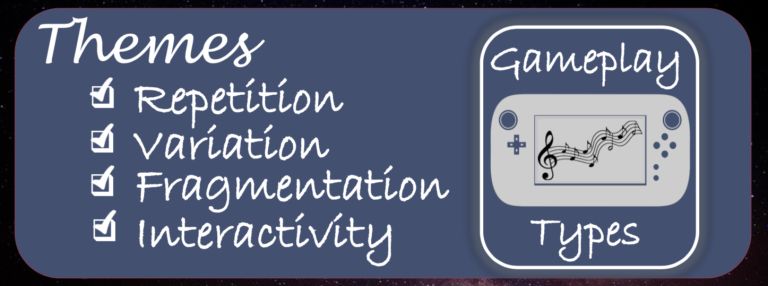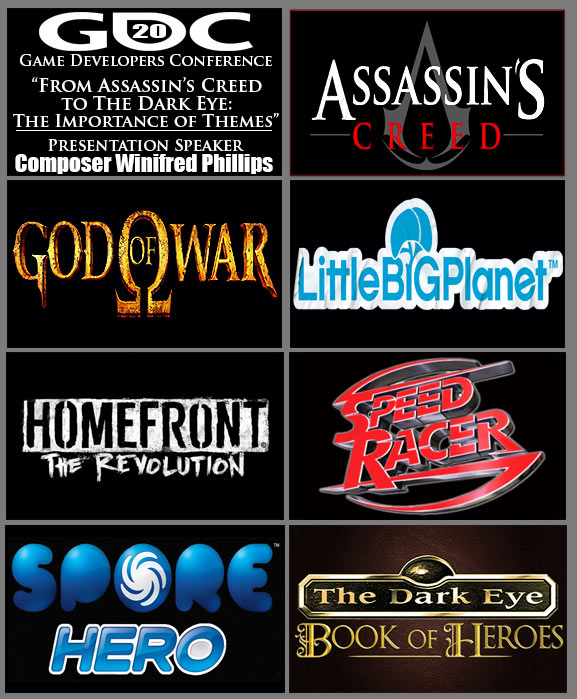Trending
Opinion: How will Project 2025 impact game developers?
The Heritage Foundation's manifesto for the possible next administration could do great harm to many, including large portions of the game development community.

Featured Blog | This community-written post highlights the best of what the game industry has to offer. Read more like it on the Game Developer Blogs or learn how to Submit Your Own Blog Post
The first installment of a five-part article series based on game composer Winifred Phillips' presentation during the GDC 2020 online conference. Session was entitled "From Assassin's Creed to The Dark Eye: The Importance of Themes."


By Winifred Phillips | Contact | Follow
So happy you've joined us! I'm video game composer Winifred Phillips. Last March, I gave a presentation at the very first online Game Developers Conference. My talk was entitled "From Assassin's Creed to The Dark Eye: The Importance of Themes" (I’ve included the official description of my talk at this end of this article). This coming August, I'll be participating as a speaker in the upcoming GDC Summer online conference. My session this August will be a wide-ranging Ask-Me-Anything Q&A, and I'm really looking forward to it! In anticipation of that conference session, I thought it might be useful for me to share the content of my March GDC talk in a series of articles. I'm happy to now begin a five-part article series based on my GDC 2020 presentation in March!
In my GDC 2020 presentation, I discussed musical themes, and I shared some stories about my work composing music for lots of great game projects. I'll be sharing the same stories here. Those projects include Assassin's Creed Liberation (Ubisoft), God of War (Sony Interactive America), the LittleBigPlanet franchise (Sony Interactive Europe), Homefront: The Revolution (Deep Silver), Speed Racer (Warner Bros Interactive), Spore Hero (Electronic Arts), and The Dark Eye: Book of Heroes (Wild River).
But before we start digging into practical examples, let’s take a quick look at one of the best and most iconic themes in the history of music for media. I've included a short excerpt below. Notice how we hear a melodic phrase once, then we hear it again, and it’s exactly the same as before. So the melody is saying, “hey – you liked that? Here, have another!"
As you can see, this is everybody’s top composition for talking about musical themes. It’s the one that everybody can identify within the first few bars. That’s part of why it’s one of the best and most famous examples.

Let's briefly consider this theme in terms of its hook.
The Hook
 We all know that a hook in music is a thematic element that catches the mind. In Star Wars, it takes the form of that awesome four-bar melody. Right away we can see one of the core design features of the ever popular Star Wars theme – it’s built around repetition.
We all know that a hook in music is a thematic element that catches the mind. In Star Wars, it takes the form of that awesome four-bar melody. Right away we can see one of the core design features of the ever popular Star Wars theme – it’s built around repetition.
In the Star Wars theme, we get full statements of that main melody (complete with its internal repetition), and then we get a contrast section or a bridge, and then we’re right back to another full statement of that same internally-repeating main melody. This pattern happens five times over the course of the Star Wars theme:
So it’s no wonder we remember the theme so well. By the time we’re finished listening to it, we’ve had that melody drummed into our heads. The music is a big part of the identity of the Star Wars franchise. It’s the musical signature of Star Wars. How does the idea of musical signatures apply to game music?
 Well, in games, music has an especially important role to play. It seems that, according to some really cool expert research from the University of Geneva, music has a special power. Music is a super-mnemonic. It makes us remember things, and it does it better than most anything else. Just like smells can bring back really detailed memories, music can do the same thing. And the fact that we hear game music while we’re participating in something active and engaging means that the music has an even better chance of being remembered. Active experiences are proven to be remembered better than passive ones.
Well, in games, music has an especially important role to play. It seems that, according to some really cool expert research from the University of Geneva, music has a special power. Music is a super-mnemonic. It makes us remember things, and it does it better than most anything else. Just like smells can bring back really detailed memories, music can do the same thing. And the fact that we hear game music while we’re participating in something active and engaging means that the music has an even better chance of being remembered. Active experiences are proven to be remembered better than passive ones.
This means that game music has a unique ability to define the identity of a game, and help players remember it. However, in order for the music to remind players of the game, we have to make sure that we compose the music to be as memorable as possible. That’s where themes come in.
 Over the course of these five articles, we’ll be discussing what makes musical themes memorable, including the importance of repetition. We’ll look at composition strategies to keep things fresh, including variation and fragmentation. We’ll check out how musical themes hold up inside interactive constructs, and we’ll discuss some of the different kinds of gameplay that can benefit from thematic composition. Along the way I’m going to be sharing what I’ve learned about thematic composition from a bunch of my own video game projects.
Over the course of these five articles, we’ll be discussing what makes musical themes memorable, including the importance of repetition. We’ll look at composition strategies to keep things fresh, including variation and fragmentation. We’ll check out how musical themes hold up inside interactive constructs, and we’ll discuss some of the different kinds of gameplay that can benefit from thematic composition. Along the way I’m going to be sharing what I’ve learned about thematic composition from a bunch of my own video game projects.
So let’s start with one of my most recent games – the latest entry in the award-winning Dark Eye video game franchise, which was just released on June 9th.

I was really excited about composing the music for The Dark Eye: Book of Heroes. It’s an RPG video game based on the Dark Eye fantasy world, which is the most popular European RPG with over 35 years of fantasy lore behind it and millions of fans.
Right from the start, the developers and I focused on a 4-minute main theme track in which I would assert the game’s musical signature:

To make it memorable, I restated that theme in six variations. As game composers, we want that hook to grab hold and stick in the mind. So, while The Dark Eye Book of Heroes main theme develops its ideas and includes bridge sections and secondary melodies, the main hook keeps on coming back. Let’s see how that worked:
As you could hear, it’s an overt strategy designed to ensure that a melody is remembered. To experience the recurring thematic material in context, here's the main theme of The Dark Eye: Book of Heroes in its entirety:
So now we've considered the importance of a musical hook. We've looked at how repetition can solidify the connection between a dynamic melodic hook and the identity of the project it accompanies. We've considered the power of game music as a particularly effective mnemonic device. Finally, we've considered these concepts in connection with practical examples from Star Wars and my own recent project, The Dark Eye: Book of Heroes. In the next article of this series, we'll be considering more subtle uses of themes in video game scores. Along the way, I'll be sharing some behind-the-scenes stories of the thematic composition process for two of my projects - Assassin's Creed Liberation, and Homefront: The Revolution. Until then, thanks for reading!

(Game Developers Conference Session Description)
Through an exploration of her work composing music for games such as Assassin’s Creed Liberation, God of War, LittleBigPlanet and the upcoming RPG The Dark Eye: Book of Heroes, composer Winifred Phillips will examine the potential of thematic music to enable a game to stand out as special and unique.
By employing musical themes, a composer can infuse a game with a strong sense of character and originality.
According to research, music heard during activities is remembered vividly. Coupling this with the innately memorable nature of themes allows a game composer to create an indelible musical signature for any game. This talk will examine composition techniques that extend the life and utility of themes. Variation, development, figures, fragmentation, and motifs will be explored, along with examples of themes in combat, menus, cutscenes, and stingers. Finally, dynamic music construction will be considered, including workarounds to enable effective themes within interactive systems.
Using examples from several games, Phillips will discuss specific composition techniques designed to enhance the utility of thematic content. Attendees will learn how themes may be incorporated into specific game music asset types. Also included in the discussion: composition adjustments required by interactive music constructs.
This session will present inspirational ideas for composers seeking to create distinctive musical signatures for their game projects. Discussion of thematic use within different types of game music assets may be helpful for audio developers engaged in preparing music design documents. The talk will be approachable for all levels.
 Winifred Phillips is a well-known video game composer whose latest project is the hit PlayStation 5 launch title Sackboy: A Big Adventure (soundtrack album now available). Popular music from Phillips' award-winning Assassin's Creed Liberation score is featured in the performance repertoire of the Assassin's Creed Symphony World Tour, which made its Paris debut with performances by a top 80-piece orchestra and choir. As an accomplished video game composer, Phillips is best known for composing music for games in five of the most famous and popular franchises in gaming: Assassin’s Creed, God of War, Total War, The Sims, and Sackboy / LittleBigPlanet. She is the author of the award-winning bestseller A COMPOSER'S GUIDE TO GAME MUSIC, published by the MIT Press. As one of the foremost authorities on music for interactive entertainment, Winifred Phillips has given lectures at the Library of Congress in Washington DC, the Society of Composers and Lyricists, the Game Developers Conference, the Audio Engineering Society, and many more. Phillips’ enthusiastic fans showered her with questions during a Reddit Ask-Me-Anything session that went viral, hit the Reddit front page, received 14.9 thousand upvotes, and became one of the most popular gaming AMAs ever hosted on Reddit. Follow her on Twitter @winphillips.
Winifred Phillips is a well-known video game composer whose latest project is the hit PlayStation 5 launch title Sackboy: A Big Adventure (soundtrack album now available). Popular music from Phillips' award-winning Assassin's Creed Liberation score is featured in the performance repertoire of the Assassin's Creed Symphony World Tour, which made its Paris debut with performances by a top 80-piece orchestra and choir. As an accomplished video game composer, Phillips is best known for composing music for games in five of the most famous and popular franchises in gaming: Assassin’s Creed, God of War, Total War, The Sims, and Sackboy / LittleBigPlanet. She is the author of the award-winning bestseller A COMPOSER'S GUIDE TO GAME MUSIC, published by the MIT Press. As one of the foremost authorities on music for interactive entertainment, Winifred Phillips has given lectures at the Library of Congress in Washington DC, the Society of Composers and Lyricists, the Game Developers Conference, the Audio Engineering Society, and many more. Phillips’ enthusiastic fans showered her with questions during a Reddit Ask-Me-Anything session that went viral, hit the Reddit front page, received 14.9 thousand upvotes, and became one of the most popular gaming AMAs ever hosted on Reddit. Follow her on Twitter @winphillips.
Read more about:
Featured BlogsYou May Also Like